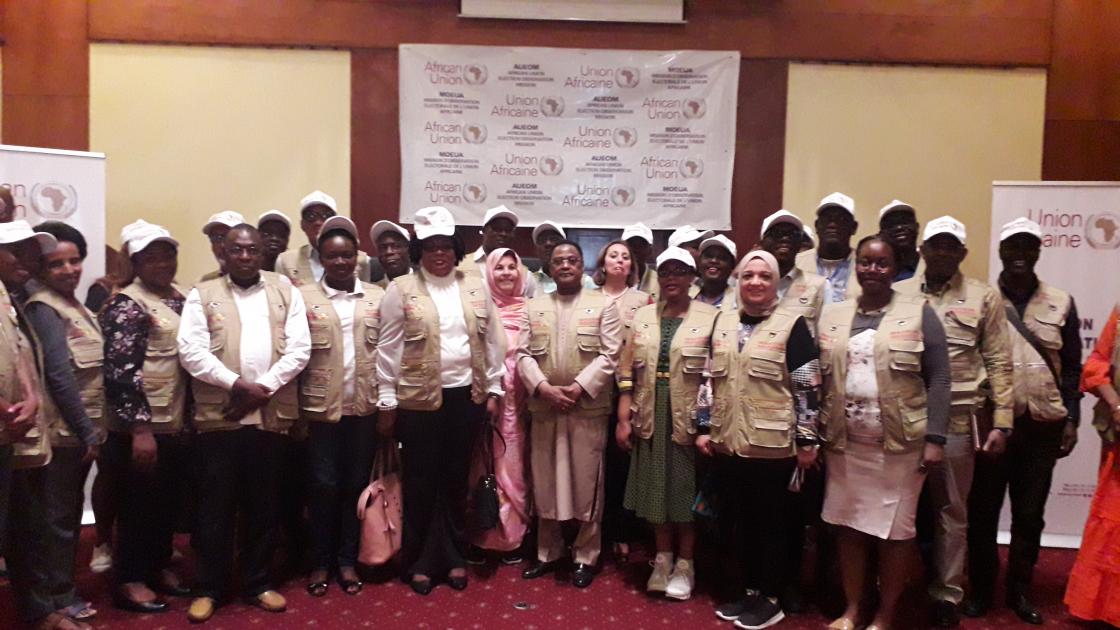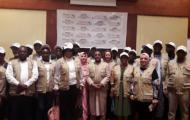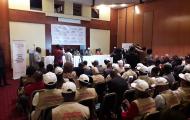Preliminary Statement : African Union Election Observation Mission to the 9th February 2020 Legislative and Municipal Elections in the Republic of Cameroon
Preliminary Statement : African Union Election Observation Mission to the 9th February 2020 Legislative and Municipal Elections in the Republic of Cameroon
AFRICAN UNION ELECTION OBSERVATION MISSION TO THE 9TH FEBRUARY 2020 LEGISLATIVE AND MUNICIPAL ELECTIONS IN THE REPUBLIC OF CAMEROON
PRELIMINARY STATEMENT
Yaounde, 11 February 2020
I. INTRODUCTION
1. At the invitation of the Government of the Republic of Cameroon, the Chairperson of the African Union Commission (AUC), H.E Moussa Faki Mahamat deployed a Short Term African Union Electoral Observation Mission (AUEOM) to follow, assess and report objectively on the 9th February 2020 legislative and municipal elections.
2. The deployment of the AUEOM is in line with the African Charter on Democracy, Elections and Governance (ACDEG), the OAU/AU Declaration of Principles Governing Democratic Elections in Africa, the AU Guidelines for Elections Observation and Monitoring Missions, the African Peer Review Mechanism and other relevant international instruments on electoral observation, as well as the Constitution and existing laws of the Republic of Cameroon. This is also consistent with Aspiration 3 of the Agenda 2063, which envisions an “Africa of good governance, democracy, respect for human rights, justice and the rule of law”.
3. The AUEOM is led by H.E Seini OUMAROU, former Prime Minister of the Republic of Niger, and comprises 34 observers drawn from the Pan African Parliament (PAP), African Union Commission, Election Management Bodies (EMBs), Civil Society Organisations (CSOs), and Electoral Experts from 27 AU Member States.
4. This statement provides the AUEOM’s pre-election observations and preliminary assessment of the opening, voting, closing and counting processes of the 9th of February 2020 legislative and municipal elections. The Mission will continue to follow the ongoing electoral process, including the tabulation of the results. A more comprehensive report will be released in due process.
II. OBJECTIVES AND METHODOLOGY
5. The AUEOM aims to provide an independent and impartial assessment of the conduct of the 9th February 2020 legislative and municipal elections and formulate relevant recommendations to improve the electoral processes in the future.
6. In order to achieve these objectives, the Mission held consultative meetings with various electoral stakeholders, including Elections Cameroon (ELECAM), the Constitutional Court, Civil Society Organisations, Political Party representatives and other international election observer groups. Before their deployment, the AU short-term observers participated in a two-day orientation, training sessions and briefings from stakeholders. They were also introduced to the use of tablets for election observation data collection.
7. On Polling Day, the AUEOM deployed 13 teams in 6 regions, namely Adamawa, East Cameroon, Central Cameroon, South Cameroon, Littoral Cameroon and West Cameroon.
III. PRELIMINARY FINDINGS
A. General Political Context
8. The pre-election political context has been characterized by security and political tensions. Some regions of the country have experienced violence for several years. The Far North region of Cameroon is particularly affected by the presence of Boko Haram terrorist activities. Whereas the North West and the South West regions are regularly experiencing clashes between separatist groups and the security forces. These security issues are among the reasons for the postponement of the legislative and municipal elections initially planned in 2018.
9. The political context has also been affected by tensions resulting from contested results of the 2018 Presidential elections, which led to demonstrations and arrests of protesters, who were mainly from the Cameroon Renaissance Movement (MRC). in order to resolve the multiple political challenges, the Government organized a National Dialogue with all the main political and social actors in the country from September 29 – October 4, 2019. The outcome of the National Dialogue resulted in the release of political prisoners, and adoption of Law No. 2019/024 of 24 December 2019, on Decentralization, with a special status for the Anglophone regions. These measures contributed to decrease incidences of violence in the Angolophone regions, and ease political tensions in the country. Consequently, this allowed for the call for the 9th February 2020 legislative and municipal elections. However, a segment of the opposition parties, including the Cameroon Renaissance Movement (MRC), decided to boycott these elections. This was motivated by views that the legal framework was inadequate, and the secuity situation in the NorthWest, South West, and Far North was not conducive to holding democratic elections. Based on the foregoing, the AUEOM has noted the lack of consensus around the conduct of these elections.
B. Legal Framework
10. The legal framework for the 9th February 2020 legislative and municipal elections comprises the Constitution of 2nd June 1972, as amended from time to time and the Electoral Code. These laws define specific conditions of the elections.
11. The laws clearly define the composition of the National Assembly and the Municipal Councils, the conditions of their election and fix the mandate of Parliamentarians and Municipal Councillors, who are both elected by direct universal suffrage. The electoral system combines the First-Past-The-Post (FPTP) System and the List Proportional Representation System.
12. The Mission is of the view that the electoral system guarantees the representation of the different political parties in the country. However, some aspects of the electoral system could be improved, particularly, limited implementation framework of the electoral code.
C. Election Management Body
13. Elections Cameroon (ELECAM) is an independent body that has the mandate of the organisation, management and supervision of elections and referenda, as per the constitution. ELECAM is made up of two bodies, the Electoral Board (EB) and a General Directorate of Elections (GDE). The members of the Electoral Board are appointed by the President of the Republic, after consultations with Civil Society and political parties represented in the National Assembly.
14. While women represent less than 30% of the Electoral Board, the Mission notes that there is absence of legal provisions for promoting women’s appointment in the Electoral Board.
D. Voter Registration
15. Section 45 of the Electoral Code states that the voter registration process is open to every citizen of either sex, having attained the age of 20 years, and free from all forms of disqualification provided by law. ELECAM administers a paermanent voters’ roll that is updated annually.
16. The 2019 voter registration process registered 172 799 new voters. For the 9th February 2020 elections, 6 855 240 were registered, including 47,01% women and 52,9% men. They were distributed among the 26 336 polling stations across the country.
17. Compared to the estimated total population of 24 million, the number of registered voters is relatively low, given that the electorate represents less than 30% of the overall population.
E. Nomination of Candidates
18. Fourty-nine (49) political parties competed for the 9th February 2020 elections. Thirty three (33) contested for the legislative, while 44 for the municipal polls. For the legislative, 211 party lists consisting of 459 candidates ran for the polls. Among all the registered parties, only the RDPC had candidates in all the constituencies.
19. The Mission notes that the amount of nomination fee (one million) per candidate and alternate candidates for the legislative elections appears to be exhorbitant and disincentive to running for political office, and undermines principle of fairness among candidates (Section 166 of the Electoral Code). The Mission also noted that the nomination fees are reimbursed to candidates who attain at least 10% of votes cast (Section 147 of the Electoral Code).
F. Campaigns
20. The election campaign began on 25 January 2020, and lasted for 15 days, ending at midnight on the eve of the Election Day. The AUEOM was informed that the campaign environment was generally calm, as security measures had been strengthened, apart from certain incidences in the North West and South West Cameroon.
21. The campaign process was initially slow-paced, but was subsequently hightened by the payment of public funding of parties paticipating in the elections. In spite of this, the general atmosphere of the campaign was with low enthusiasm.
22. While the AUEOM commends the povison of campaign financing, the Mission notes the limits to the absence of a ceiling of campaign expenditure. It also notes the lack of operationaliation of the Commission for monitoring the use of public funding in elections.
G. Civic and Voter Education
23. The ELECAM made commendable efforts to inform, sensitise and educate voters. In this regard, communication tools such as website, broadcasting of videos on the voting process, toll-free number, informative SMS, booklets and flyers on the electoral legal framework were developed. ELECAM’s efforts were also buttressed by those of the Ministry of Territorial Administration both at central and local levels.
24. However, the AUEOM noted some limitations in the information and education programs, including absence of regular update of the website and disparities between urban and rural areas.
H. Women and Person with Disabilities Participation
25. The Constitution embodies the principle of equality of all citizens before the law. The AUEOM notes that measures were taken by ELECAM to encourage women’s participation in public life through the obligation on political parties to include gender considerations in their candidate lists. However, the Mission deplores the absence of legal measures for promoting and encouraging female candidacies in elections.
26. Regarding persons living with disabilities, the AUEOM welcomes the initiative taken by ELECAM to facilitate and ensure their effective participation in the electoral process.
I. ELECTION DAY OBSERVATIONS
27. The Election Day findings by AU Observers are drawn from observation made in 176 polling stations, including 79% in urban areas and 21% in rural areas.
Opening of Polling
28. The Opening Procedures were generally in accordance with the relevant legal provisions. Members of the Local Polling Commission followed the correct opening procedures. The Mission observed that in all the polling stations where they were able to observe, the opening procedures without interference or restrictions.
29. The Voting Process started on time in 75% of the polling stations observed. In the remaining 25% of polling stations, AUEOM observed that there were delays of about 30 minutes to 1 hour, which resulted from the late lay-out of polling stations, or late arrival of election materials.
Polling Stations Accessibility
30. All the polling stations were in public premises, mainly schools, as provided for in the Section 96 of the Electoral Code. They were also easily distinguishable by the voters. However, 30% of the polling stations observed were not easily accessible to persons with disabilities.
Election Materials
31. Elections materials were available in adequate quantities throughout the Polling Day in all the polling stations visited by the Mission. However, the AUEOM noted the lack of adequate lighting during the counting process.
Election Personnel
32. In all the polling stations visited by the Mission, the Local Polling Commissions comprised at least three members, which is the minimum number required by the law (Section 57 of the Electoral Code).
33. Generally, polling officials carried out their duties in a professional manner, complied with the legal provisions and interacted with party agents, voters and observers. No interference in the work of observers or party agents was observed or reported to the Mission.
Voting procedures
34. In all the polling stations visited by AU observers, the voting process was calm and peaceful. Voting procedures as defined by articles 102 to 106 of the electoral code have been followed. Voters identity has been systematically verified against the voters’ roll of the polling station and the presentation of national identity card or electoral card was required.
35. The Mission observed the voting of police officers in the polling station of Matamfem C (Nlongkak, Mfoundi) while they were not registered in the voters ’roll. Their names were added to the list opened by the Presiding Officer.
36. Voters who benefited from adequate assistance when required, were observed in 63% of the polling stations visited by the Mission. In most of the cases, the assistance was provided by persons authorised by the electoral law. However, the AUEOM noted few cases (5%) where it was carried out by party agents, which is prohibited by section 105 of the Electoral Code.
37. No campaign activities were observed around or in the polling stations. However, some posters were observed in a few polling stations.
38. The AUEOM noted that secrecy of the ballot was preserved in the 176 polling stations visited.
Electoral Participation
39. The Mission witnessed low numbers of people showing up to cast their votes throughout the Election Day. There was notably, limited participation of the youth as voters.
Observers and Party/Candidate Agents
40. Section 54 of the Electoral Code provides that Political Parties or Candidates that are competing are represented in the Local Polling Commission. These agents are involved in the voting process, counting and drafting of electoral documents.
41. In all the polling stations visited, the AUEOM noted the presence of at least one political party agent. The Cameroon People’s Democratic Movement (RDPC), Union of the Peoples of Cameroon (UPC), Parti Camerounais pour la Reconciliation Nationale (PCRN) and Peuple Uni pour la Renovation Sociale (PURS), PADDEC and SDF were the most active. The Mission also noted a limited presence of citizen observer groups.
Security
42. The AUEOM observed visible presence of security forces in 87% of the polling stations visited, whose presence was assessed as discreet and professional. Their presence was considered as insufficient in only 4% of the polling stations visited. The Mission noted that the voting process took place without any incident in all the polling stations visited.
Closing of the Polls and Counting of Votes
43. In general, closing and counting procedures were conducted in accordance with the law. Voters in the queue at the closing time were allowed to vote and to participate in the counting process, as provided by the electoral law.
44. The Mission observed the closing and counting procedures and noted that both processes were conducted without any incident in all the polling stations visited. Observers were allowed inside the polling stations to observe without any interference or restrictions. However, the Mission notes that there was not enough lighting during the counting process, which delayed the procedure of counting.
45. Generally, members of the Local Polling Commissions were familiar with the procedures of closing and counting.
Conclusion and Recommendations
The 9th February 2020 legislative and municipal elections took place in a context of political and security challenges. They were also marked by limited consensus among political stakeholders, which impacted on their inclusivity and enhanced participation of voters. The Mission urges all Cameroonian stakeholders to sustain inclusive dialogue, which commenced during the National Dialogue .
The AUEOM would like to take this opportunity to express its gratitude to the government and the people of Cameroon for their hospitality.
Based on its findings and observations, the Mission makes the following recommendations with a view to improving future electoral processes in the Republic of Cameroon. It should be recalled that a number of these recommendations were made during the 7th October 2018 Presidential elections.
To the Government and Legislative authorities:
Take all the necessary actions to guarantee the inclusivity of the electoral process and enhance citizen participation, in accordance with the AU Peace and Security Council’s communiqué of the 869th Meeting on Elections in Africa (19th August 2019);
Create a platform for dialogue and consultation among all the stakeholders, to rebuild confidence in the electoral processes;
Clarify legal provisions regarding the elections to prevent diverging interpretations and implementing existing laws;
Reinforce the independence of ELECAM, in accordance with the African Charter on Democracy, Elections and Governance, particularly regarding the appointment of its members;
Take all the necessary measures to promote the political and electoral participation of women and youth, including the adoption of a quota system; and align the age of electoral majority with that of criminal responsibility.
To the Political Parties
Political parties are encouraged to participate more in the electoral process, by deploying their representatives or party agents in polling stations.
To ELECAM :
ELECAM is urged to enhance their civic and voter education, so as to encourage voter participation. More weight should be put on encouraging the youth to participate in electoral processes.
Consider the institutionalisation of a permanent legal and consultative framework to promote interactions with political parties and other stakeholders to ensure a participation and inclusivity throughout the electoral process;
Introduce an authentification system of the ballot papers and facilitate the identification of the members of the Local Polling Commission to reinforce the integrity of the election;
Pursue efforts towards the effective participation of persons with disabilities and the elders.
To the Civil Society
Civil Society Organizations are encouraged to participate more in the electoral process by conducting civic and voter education, as well as by monitoring the elections, to ensure citizen awareness and local ownership of the process and its outcome.
Topic Resources
Agenda 2063 is Africa’s development blueprint to achieve inclusive and sustainable socio-economic development over a 50-year period.
Strategic Policy Framework and Plan of Action on Ageing
39th AU summit Media Accreditation Platform












